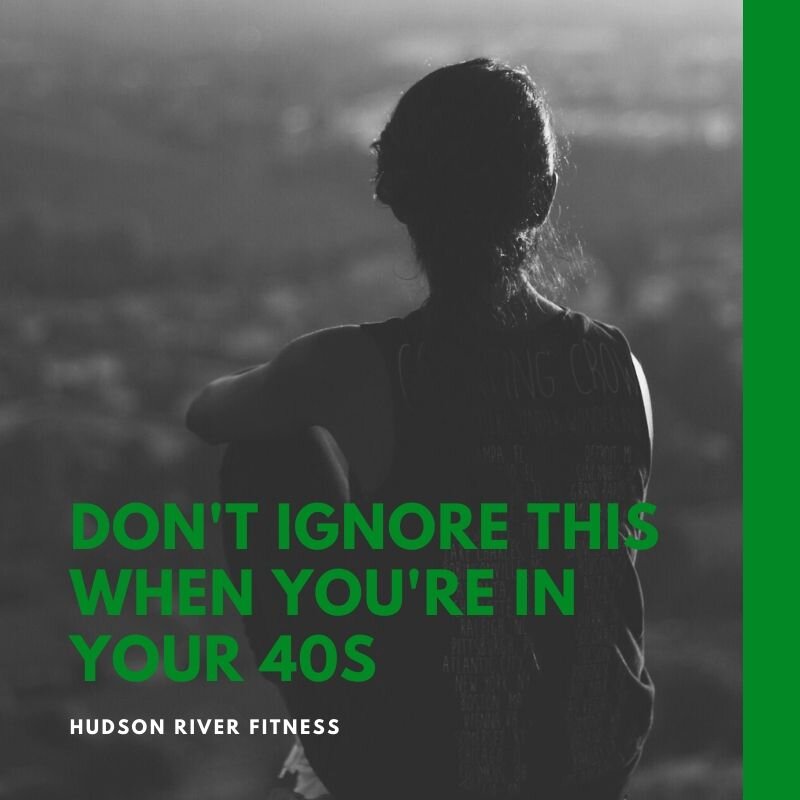We live in a time where there are endless options for health and fitness. There is a gym on every single block in our town, fitness equipment sales are still growing, and fitness apps are on pretty much every American phone. However, with the rise in options, there still seems to be a growing number of unhealthy adults and folks who are not satisfied with their results.
The problem isn’t the access to fitness modalities, but it may be that there is limited guidance on identifying the best option based on goals and age related health priorities. Since there is so much conflicting information out there, it can be overwhelming to understand and find the right program for you and your goals.
Especially as we enter the 4th decade of life, not only are there many changes that occur, but it also becomes increasingly hard to ignore distractions (all the information) that comes our way. Over the next three days we will talk about the training and health priorities in the 40s. Today we will be discussing the general changes and action steps, tomorrow we will talk about women, and on Wednesday, we’ll focus on men. Feel free to share this with your friends who are having trouble with health and fitness as they get older.
Humans reach peak physical capacity in their 20s and 30s, and then it starts to plateau and slowly decline into the 4th decade. There are 4 common fitness/health themes that both men and women face when they get into their 40s: decreased muscle mass, increased risk of chronic diseases, digestion issues, and a decrease in overall sweat production. Each of these components have interrelated action steps to maximize forward progress. Not to say that getting six pack abs, running a marathon, or any other physical feat is out of the question for when you are in your 40s, but before doing so, the minimum requirements must be met as described below.
Age related sarcopenia (muscle and strength loss) begins as we enter the 40s. This is due to many reasons such as decreased activity, reduced anabolic hormones (testosterone, etc.) available in the blood. Reduced muscle mass actually results in a slower metabolism (less calories burned at rest), decreased strength, reduced muscle tone, and an increase in overall body fat percentage (lb/kg of body fat divided by lb/kg of body weight). Many may think to counteract these changes is to just do more cardio, however, strength training is going to be paramount at this age.
Lifting weights and moving against resistance is crucial for the development of lean muscle. Think about adding in functional movement like weighted squats, deadlifts, and presses into your routine to maximize the effect of your training. Light weights will be really helpful to make sure that lifting form is correct, but once position is stable and consistent, start adding the resistance. I promise that you will bulk up from this type of training (unless you want to), as it takes hours at the gym and a lot of eating (the right things) to put on that kind of mass. But at this stage, you should be aiming for moderate to high intensity resistance between 5-12 repetitions. The occasional 1 rep max testing is going to be ok for you (as long as your technically sound), to establish new strength baselines and provide you a better idea of what type of weights you should be moving. Not only will you look better, but you’ll also feel better because you won’t be constantly be beaten down by high intensity cardio all the time.
Increasing your muscle mass will improve aesthetics, functional strength, but also reduces your overall body fat percentage. The less body fat you have per pound body weight, the more tone you’ll appear, but it will also reduce your risk of chronic diseases like Diabetes, high blood pressure and high cholesterol. The idea numbers to shoot for are below 25% in men and below 33% in women. Any numbers higher than that can increase your risk.
Digestion also changes as we age. This is the time where digestion become a little less active and more sensitive. Some of you may notice that your body responds very differently from the foods that you’re used to eating resulting in constipation, bloating, and/or diarrhea. During this time, you should definitely be focusing on food quality including: lean proteins, clean carbs, and having a vegetable at every meal. If 2-3 cups of vegetables per week sounds daunting to you, then you are probably not eating enough of them. Alcohol also has a bigger impact as we age, especially since alcohol metabolism slows down resulting in longer hangovers and a slower recovery time after drinking.
Stress may also increase in this age as new job promotions occur, life events (relationships, children, etc.) take up the little time we have available. As a result, the opportunity for exercise and activity may decrease. Being sedentary actually slows down the digestive tract, making it hard to be regular. If you feel like you are having trouble being ‘regular’ look back at what you’ve eaten as well as your most recent activity and stress levels.
As we age, we also experience a reduced ability to sweat. The sweat glands and nervous systems are not as active as they were before. As a result, body temperature regulation will be slightly different as compared to the 20’s and 30s. It is important to stay hydrated and active, however, do not let sweating or soreness be an indicator of an effective workout. If you do, you could be running into issues of dehydration, overexertion and injury.
It will take longer to recover from really hard and intense workouts, and even longer to recover from an injury. However, there are many action steps that you can take to work around these speed bumps:
-
Sleep at least 7 hours per night
-
Eat vegetables at every single meal
-
Eat a lean protein at each meal
-
Limit longer high intensity cardio sessions to 2-3 times per week, and prioritize strength training
-
Manage your stress (through exercise, meditation, leisure activities)
-
Warm up before working out meaning: increased body temperature, increased mobility, and prime the body for movement
The 40s don’t have to be a time where you feel like everything’s falling apart. In fact, life is only getting better. Focus on these priorities and you will have a long and healthy life. Check in tomorrow to hear about the priorities for women in their 40s!
Interested in working with a coach who has your goals in mind? Click here to book a free no sweat intro phone call where we will discuss your goals, motivations, and identify the best plan of action for you to achieve them!
If you want group fitness:
We are running a group fundamentals program next week Monday 1/6, Wednesday 1/8, and Friday 1/10, at 7:15am. Usually our private fundamentals program is $330, but click here to sign up for next week and save $100 (pay $230). Complete those sessions and you’ll be ready to hop into our group classes!
Have a great day,
Ashley
The owner will not be liable for any errors or omissions in the information provided nor will the owner be liable for any accidents, injuries or other damage, howsoever occurring to any person or property arising out of or in any way connected to the use or application of information obtained from this message


